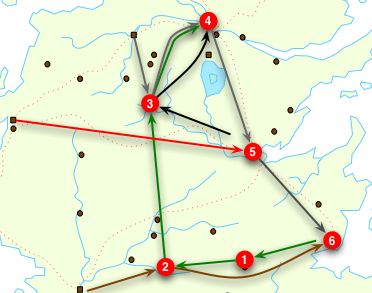Battle of Ashford
| Battle of Ashford | |||||||||||||||||
|---|---|---|---|---|---|---|---|---|---|---|---|---|---|---|---|---|---|
 Location 2, Factions:Baratheon. Stark. Tyrell. Lannister. Targaryen. | |||||||||||||||||
| Conflict | Robert's Rebellion | ||||||||||||||||
| Date | 282 AC | ||||||||||||||||
| Place | Ashford | ||||||||||||||||
| Result | Royalist victory | ||||||||||||||||
| |||||||||||||||||
The Battle of Ashford[1] was a battle fought during Robert's Rebellion between royal and rebel forces at Ashford, the seat of House Ashford in the Reach. The van under Lord Randyll Tarly won most of the loyalist victory, although Lord Mace Tyrell, Warden of the South, took the credit.[2][3]
Contents
Prelude
With the stormlands united behind him following the battles at Summerhall, Lord Robert Baratheon left his brother Stannis to hold Storm's End and advanced west to Ashford.[4] Ashford, located within the Reach, was sworn to Highgarden and was likely a loyalist holding. It is possible that Robert tried to take Ashford to secure the stormlands' western flank against the threat of the Tyrells (who could muster the largest army in the realm), or he may have been outmaneuvered by Lord Randyll Tarly.
Battle
The battle occurred when the van of the Tyrell army under command of Lord Randyll Tarly ran into Lord Robert Baratheon's forces. Randyll's forces overran Robert's army, and Robert was forced to withdraw from the field before the main force of the Tyrell host had joined the battle.[2]
Lord Cafferen, a former Targaryen loyalist who had joined the rebels after his defeat at Summerhall, was cut down by Randyll whilst fighting for Robert. Randyll had his head sent to King Aerys II Targaryen.[4] On the Reach side, one casualty of note was Lord Mace's cousin, Ser Quentin Tyrell.
Aftermath
The result of the battle was marked by Tyrion Lannister as inconclusive, thus it is likely the battle was not very large and Robert's forces remained relatively intact.[2] However, faced with the large numbers of the main Tyrell force, Robert had no choice but to withdraw from the south and attempt to link up with his allies in the north. To this end, he force-marched his troops north towards the riverlands. Robert's withdrawal from the stormlands allowed the victorious Tyrell army to invade the stormlands and lay siege to Storm's End.
References
- ↑ The World of Ice & Fire, House Tyrell.
- ↑ 2.0 2.1 2.2 A Storm of Swords, Chapter 19, Tyrion III.
- ↑ A Storm of Swords, Chapter 78, Samwell V.
- ↑ 4.0 4.1 A Storm of Swords, Chapter 36, Davos IV.
| ||||||||||||||